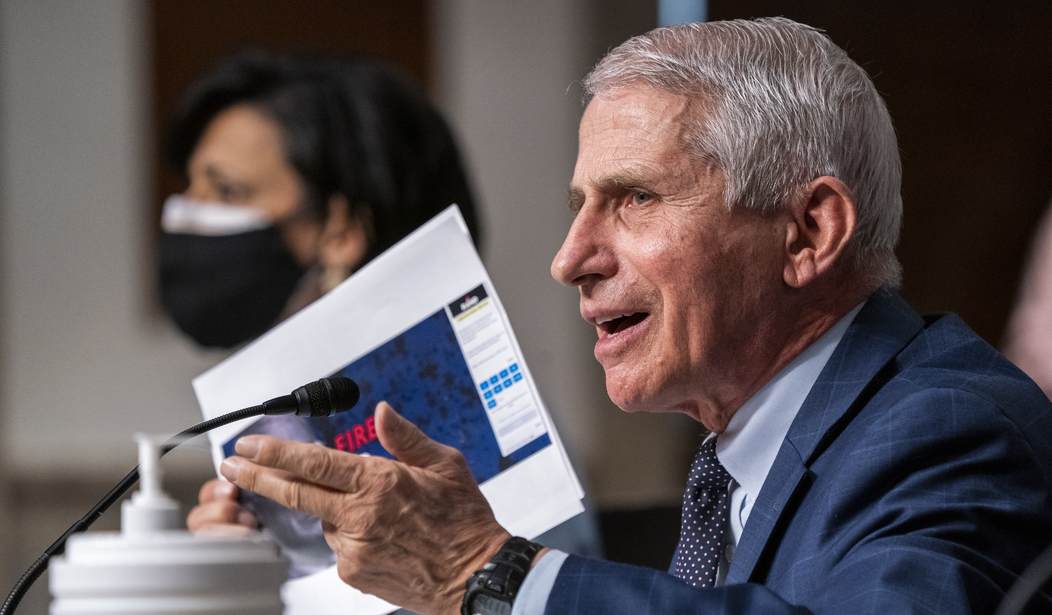Dr. Bhattacharya: Here's Why the WHO Treaty Is Fauciism on Global Steroids

The popular definition of insanity is "doing the same thing over and over again and expecting a different result." That perfectly characterizes a new effort by the UN, the Biden administration, and far-left foundations to expand the power of the World Health Organization (WHO). Negotiations for a treaty not only breathe life back into the discredited pandemic management policies pushed by Anthony Fauci and empire-building bureaucrats in the US but seek to make them unaccountable by having WHO dictate them to member nations without redress or debate.
Dictate is the operative word, too, because the treaty would also give WHO jurisdiction over "misinformation." This has echoes of the worst of the speech-suppressing policies pushed by Fauci, the State Department, and Big Tech. One of the biggest targets for that censorship, Great Barrington Declaration co-author Dr. Jay Bhattacharya, warned about this in a RealClearPolicy essay last week co-authored by Kevin Bardosh. The WHO's funding ask is outrageous enough, but the power grab is much more dangerous and insidious:
Read through the current draft of the treaty itself and you will find a whole section dedicated to “fighting misinformation.” There is no section focused on preventing harm. Those speaking out about these dangers have been subjected to harsh censorship. Once esteemed professionals were summarily fired for describing the reality of what was happening. The authors of the anti-lockdown Great Barrington Declaration—professors at Stanford, Harvard, and Oxford—were subject to a “devastating takedown” at the hands of Dr. Fauci and top scientific bureaucrats at the National Institutes of Health and the WHO.
Public health came to resemble the police, and those pushing the new WHO treaty want to go further. It calls for more mandates, more vaccine passports, and more censorship—our new global health “Lockdown Doctrine.”
Proponents of the treaty would have you believe that it is merely a tool that countries can use to guide future pandemic response efforts, that it cannot trump national sovereignty or be used to force failed policies on entire populations. But the lifeblood of international treaties is not in the dried ink. Treaties are constantly ignored. Nonetheless, they do one thing very well: they create an illusion of consensus, signaling to those with power and influence. These priorities are then filtered down into national laws and plans where they can do tremendous damage.
Dr. Bhattacharya spoke with me yesterday about the disastrous attempt to set bad policies and speech suppression into an unassailable and autocratic regime. The full interview is below, but here are some highlights of our discussion, cleaned up a bit from the AI-generated transcript. Both of us express grave concern over the rise of "scientism," specifically in the form of Anthony Fauci, as well as a refusal to apply any critical analysis to public-policy decisions in light of new data ... and sometimes old data as well.
===
Q: You were one of the victims of the scientistic, and I use that term advisedly. It's not scientific, it's scientistic. Scientism as a sort of a belief system. And its high priest was a guy named Anthony Fauci. And to disagree with him or to dissent from him was an attack on science itself. And I'm not exaggerating that, am I?
A: No, he literally said that to some CNN interviewer. I mean, I was absolutely stunned, right? It's one of these things where like, you know, we religious types get accused of this kind of sort of unreasoned faith. But in fact, I've never seen even as a religious person, I've never seen anything more on reasoned faith than in the faith that people placed in Tony Fauci. Scientism is exactly the right word. ...
Q: The problem is that when you allow that type of dystopia to take place, as we did during the pandemic, when we allowed bureaucrats with MDs and PhDs to dictate all of our choices because we didn't know what to do, and you don't have accountability, you don't have debate over those things, you miss the truth.
No comments:
Post a Comment